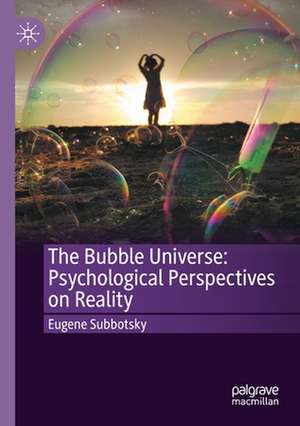The Bubble Universe: Psychological Perspectives on Reality
Autor Eugene Subbotskyen Limba Engleză Paperback – 30 iul 2021
This book examines the role that human subjective experience plays in the creation of reality and introduces a new concept, the Bubble Universe, to describe the universe as it looks from the subjective viewpoint of an individual. Drawing on a range of research, the author questions the extent to which the scientific study of the origins of life, consciousness and subjective experience is itself influenced by scientists’ subjective worlds.
The author argues that in many respects the Bubble Universe differs from the universe as described by science and religion, and analyzes these differences. The fabric and structure of subjective reality is described, and various aspects of the Bubble Universe are examined, including science, religion, life, morality and history. The differences between the views from inside the subjective universe and from scientific, religious and sociocultural versions of the universe are outlined, and their significance for practical and theoretical problems are highlighted and illustrated with psychological experiments. This book will be of value to all scholars interested in how subjectivity influences research and appeal in particular to those working in developmental and theoretical psychology, consciousness, epistemology, phenomenology, and the philosophy of science and of the mind.
Toate formatele și edițiile
| Toate formatele și edițiile | Preț | Express |
|---|---|---|
| Paperback (1) | 644.63 lei 6-8 săpt. | |
| Springer International Publishing – 30 iul 2021 | 644.63 lei 6-8 săpt. | |
| Hardback (1) | 650.04 lei 6-8 săpt. | |
| Springer International Publishing – 29 iul 2020 | 650.04 lei 6-8 săpt. |
Preț: 644.63 lei
Preț vechi: 758.38 lei
-15% Nou
Puncte Express: 967
Preț estimativ în valută:
123.35€ • 131.90$ • 102.85£
123.35€ • 131.90$ • 102.85£
Carte tipărită la comandă
Livrare economică 18 aprilie-02 mai
Preluare comenzi: 021 569.72.76
Specificații
ISBN-13: 9783030490102
ISBN-10: 3030490106
Pagini: 380
Ilustrații: XXVII, 380 p. 28 illus.
Dimensiuni: 148 x 210 mm
Greutate: 0.54 kg
Ediția:1st ed. 2020
Editura: Springer International Publishing
Colecția Palgrave Macmillan
Locul publicării:Cham, Switzerland
ISBN-10: 3030490106
Pagini: 380
Ilustrații: XXVII, 380 p. 28 illus.
Dimensiuni: 148 x 210 mm
Greutate: 0.54 kg
Ediția:1st ed. 2020
Editura: Springer International Publishing
Colecția Palgrave Macmillan
Locul publicării:Cham, Switzerland
Cuprins
Part I. The Bubbleverse.- Chapter 1. Introduction.- Chapter 2. What and why of the Bubbleverse.- Chapter 3. Grounding the Bubbleverse.- Chapter 4. Fabric of the Bubbleverse.- Chapter 5. The Diversity of the Phenomenal World.- Chapter 6. Self in Multiple Universes.- Chapter 7. Structure of the Bubbleverse.- Part II. Cognizing the Bubbleverse.- Chapter 8. The Black Hole of Consciousness.- Chapter 9. Truth in the Bubbleverse.- Chapter 10. Exploring the Bubbleverse.- Part III. Expanding the Bubbleverse.- Chapter 11. The Great Replacemen in Perspective: the Hi-story of Science.- Chapter 12. The Hi-story of Religion.- Chapter 13. The Hi-story of the Bubbleverse.- Chapter 14. The Hi-story of Life.- Part IV. Experiencing the Bubbleverse.- Chapter 15. Transcending the Bubbleverse.- Chapter 16. Properties of the Bubbleverse.- Chapter 17. The cosmic train: a summary of sorts.- The mysteries of the Bubbleverse: Epilogue.
Notă biografică
Eugene Subbotsky is Reader Emeritus of Psychology at Lancaster University, UK, an Associate Fellow of the British Psychological Society (BPS), and a BPS Charted Psychologist. His research focuses on moral development, children’s metaphysical reasoning, magical thinking and behavior over life span, human consciousness and cognition and he has conducted cross-cultural research in Russia, Germany, UK, USA and Mexico. He is the author of 14 books including, Science and Magic in the Modern World (2018), The Child as a Cartesian Thinker (2015), Magic and the Mind (2010), The Birth of Personality (1993) and Foundations of the Mind (1993).
Textul de pe ultima copertă
This book examines the role that human subjective experience plays in the creation of reality and introduces a new concept, the Bubble Universe, to describe the universe as it looks from the subjective viewpoint of an individual. Drawing on a range of research, the author questions the extent to which the scientific study of the origins of life, consciousness and subjective experience is itself influenced by scientists’ subjective worlds.
The author argues that in many respects the Bubble Universe differs from the universe as described by science and religion, and analyzes these differences. The fabric and structure of subjective reality is described, and various aspects of the Bubble Universe are examined, including science, religion, life, morality and history. The differences between the views from inside the subjective universe and from scientific, religious and sociocultural versions of the universe are outlined, and their significance for practical and theoretical problems are highlighted and illustrated with psychological experiments. This book will be of value to all scholars interested in how subjectivity influences research and appeal in particular to those working in developmental and theoretical psychology, consciousness, epistemology, phenomenology, and the philosophy of science and of the mind.
Eugene Subbotsky is Reader Emeritus of Psychology at Lancaster University, UK, an Associate Fellow of the British Psychological Society (BPS), and a BPS Charted Psychologist. His research focuses on moral development, children’s metaphysical reasoning, magical thinking and behavior over life span, human consciousness and cognition and he has conducted cross-cultural research in Russia, Germany, UK, USA and Mexico. He is the author of 14 books including, Science and Magic in the Modern World (2018), The Child as a Cartesian Thinker (2015), Magic and the Mind (2010),The Birth of Personality (1993) and Foundations of the Mind (1993).
Caracteristici
Argues that our view of reality is fundamentally and irreversibly obscured by our subjective perspective on reality Highlights and analyses the differences between the psychological universe and the universe described by sciences Cautions that subjective experience as a part of the private psychological universe cannot be causally inferred from scientific concepts
